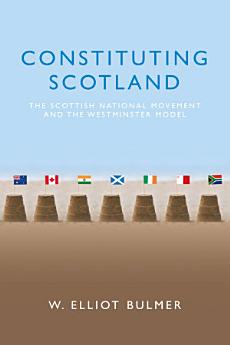Constituting Scotland: The Scottish National Movement and the Westminster Model
Jul 2016 · Edinburgh University Press
E-Book
280
Seiten
family_home
Zulässig
info
reportBewertungen und Rezensionen werden nicht geprüft Weitere Informationen
Über dieses E-Book
Long description from APFThis book contributes to the (currently sparse) literature on constitutional design in Scotland. The rise of the Scottish national movement has been accompanied by the emergence of a distinct constitutional ideas, claims and arguments. Drawing on the fields of constitutional theory, comparative constitutional law, and Scottish studies, this book examines the historical trajectory of the constitutional question in Scotland and analyses the influences and constraints on the constitutional imagination of the Scottish national movement, in terms of both the national and international contexts. It identifies an emerging Scottish nationalist constitutional tradition that is distinct from British constitutional orthodoxies but nevertheless corresponds to broad global trends in constitutional thought and design. Much of the book is devoted to the detailed exposition and comparative analysis of the draft constitution for an independent Scotland published by the SNP in 2002. The 2014 draft interim Constitution presented by the Scottish Government is also examined, and the two texts are contrasted to show the changing nature of the SNP's constitutional policy: from liberal-procedural constitutionalism in pursuit of a more inclusive polity, to a more populist and majoritarian constitutionalism. Short description (too long for box) from APFBefore the independence referendum in 2014, the First Minister of Scotland Alex Salmond promised a written constitution for Scotland in the event of a 'Yes' vote. In most other democratic countries, this would have been unremarkable. But the UK is almost unique in having never adopted a written constitution or other fundamental law. Why did this commitment arise in Scotland? What in Scotland's constitutional history and recent political trajectory brought this to the fore? What form did the SNP's proposals take, why, and what did they mean? This book addresses these questions, which remain relevant to scholars of constitutional theory, comparative constitutional law, and Scottish politics.
Autoren-Profil
W. Elliot Bulmer holds a PhD in Politics from the University of Glasgow. Previously the Research Director of the Constitutional Commission in Scotland (2009-2013), he is now part of the Constitution Building Processes team for the International Institute for Democracy and Electoral Assistance in The Hague, Netherlands. His previous works include A Model Constitution for Scotland (Edinburgh: Luath Press, 2011) and A Constitution for the Common Good (Edinburgh: Luath Press, 2014).
Dieses E-Book bewerten
Deine Meinung ist gefragt!
Informationen zum Lesen
Smartphones und Tablets
Nachdem du die Google Play Bücher App für Android und iPad/iPhone installiert hast, wird diese automatisch mit deinem Konto synchronisiert, sodass du auch unterwegs online und offline lesen kannst.
Laptops und Computer
Im Webbrowser auf deinem Computer kannst du dir Hörbucher anhören, die du bei Google Play gekauft hast.
E-Reader und andere Geräte
Wenn du Bücher auf E-Ink-Geräten lesen möchtest, beispielsweise auf einem Kobo eReader, lade eine Datei herunter und übertrage sie auf dein Gerät. Eine ausführliche Anleitung zum Übertragen der Dateien auf unterstützte E-Reader findest du in der Hilfe.







